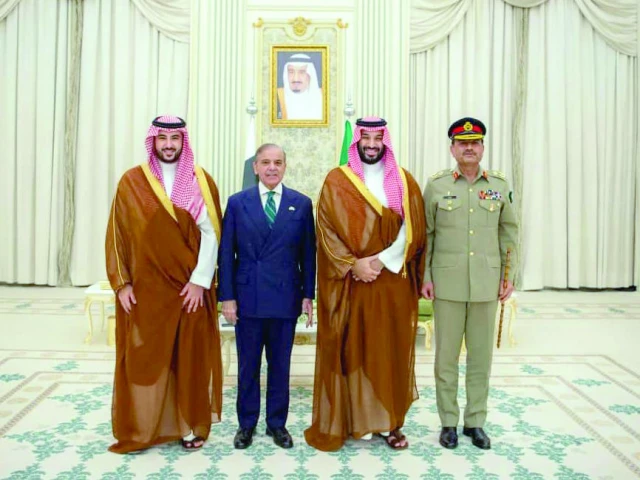LONDON:
The mutual defense agreement of nuclear Pakistan with Saudi Arabia can have a cascade effect in the Arabian Peninsula, such as Dar-Prime Minister Ishaq Dar suggested on Friday that other countries also show the interest of forging similar pacts with Islamabad.
“It is premature to say something final, but after this development, other countries have expressed their interest in similar arrangements,” said Ishaq Dar, who is also the Minister of Defense of Pakistan, while speaking with London journalists. “However, such agreements follow a regular procedure. Even with Saudi Arabia, it took several months to finalize.”
Riyadh and Islamabad signed the defense pact late Wednesday, considerably strengthening a security partnership several decades a week after the imprudent Israel strike on Qatar upset the diplomatic calculation of the region. Development occurred at a time when the Arab States of the Gulf are increasingly wary of the reliability of the United States as a security guarantor.
Dar described the agreement as a “historical step”, noting that although there has always been an implicit understanding – among the government and the people of Pakistan – concerning the commitment of the country towards Saudi Arabia, in particular the protection of the two holy mosques, the signing of the pact has now formalized this feeling.
Pakistan and Saudi Arabia are both satisfied and satisfied with the agreement, he said, adding that the kingdom has always supported in Pakistan during difficult times. “Saudi Arabia played a key role in the support of Pakistan after the international crisis and during the recent economic crisis,” he added.
Meanwhile, the Minister of Defense, Khawaja Muhammad Asif, told Reuters that nuclear weapons were “not on the radar” of the pact. He said the agreement could be extended to cover other Gulf nations.
“We have no intention of using this pact for assault,” said Asif. “But if the parties are threatened, then obviously this arrangement will become operational.”
When asked if Pakistan would now be forced to provide Saudi Arabia with a nuclear umbrella, a senior Saudi official told Reuters: “This is a complete defensive agreement that encompasses all military means.”
A declaration from Saudi Arabia said that the pact “aims to develop aspects of defense cooperation between the two countries and to strengthen joint deterrence”.
The Saudi government’s media office did not immediately respond to a request for comments on the question of whether Pakistan nuclear weapons were included in the agreement.
Wednesday’s announcement made no mention of nuclear weapons or payment in Pakistan. “The agreement stipulates that any aggression against one or the other country will be considered an assault against both,” said Pakistan. Prime Minister Shehbaz Sharif thanked the Saudi Crown Prince, Mohammed Bin Salman, for “his lively interest in broadening Saudi investments, trade and business” in a statement on Thursday.




